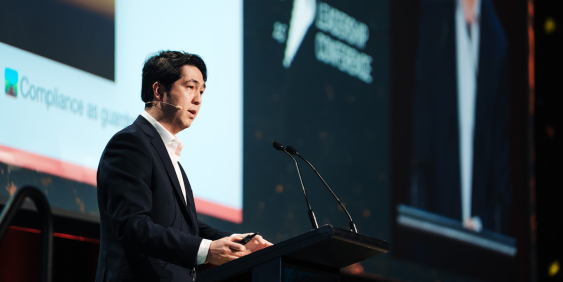Boardroom Premium


2025 IoD Leadership Conference
Entrepreneur and director Bowen Pan delivered a direct challenge to New Zealand’s governance community at the Institute of Directors' Leadership Conference 2025 last week: if Aotearoa wants to build world-class companies, it needs boards to aim higher and go faster.
In his keynote, titled Role of boards in building global winners from Aotearoa, Pan reflected on his return to New Zealand after 13 years in Silicon Valley, where he built products such as Facebook Marketplace, Stripe Apps and Common Room. He now advises and invests in high-growth companies and holds board roles with NZME and the University of Auckland Business School.
Coming back, he said, the tech and startup sector “almost feels like a different country. Thirteen years ago, tech and startups in New Zealand felt like a dirt track. Today, it’s a paved road. The foundations are strong. But roads only matter if you choose where to drive.”
Pan stressed that the drive to win is what separates dreams from outcomes. “We Kiwis already have amazing qualities like grit, ingenuity, persistence. What we need more of is that obsession that nothing else matters until you start winning. Because when you combine our best qualities with an unrelenting focus on winning . . . we’ll be unstoppable.”
Pan said the groundwork for success is clear –with Icehouse Ventures data showing a growing depth of companies reaching scale. “It’s amazing to see how rich the ecosystem has become.”
He said the numbers speak for themselves:
“We’re not a garage scene anymore,” Pan said. “This is proof we can build companies with scale and credibility. The challenge has shifted. It’s not ‘can we build?’ anymore. It’s ‘how bold are we prepared to be?’”
That boldness shows up in the lane they choose to play in, he said. Citing Phase One Venture, Pan says lane one ($10m-$100m) builds solid businesses with local impact. Lane two ($100m–$1 billion) creates firms in influence regionally. Lane three ($1 billion and beyond) change how the world works – and by capturing some of that value, can change a nation’s trajectory.
“The majority of companies are in lanes one and two – and that’s fine,” he said. “But the impact of lane three is where it really counts. That’s what’s made countries like Denmark and Israel wealthy. And if we want New Zealand to thrive in the long term, we need more companies deliberately choosing lane three.”
Pan argued that bold companies are defined not just by capital or talent, but by their expectations. “An expectation where winning is the baseline, not a nice to have. They don’t tolerate ‘good enough’, and compliance is treated as a guardrail and not the goal. Compliance is of course important, it stops you going off a cliff, but it doesn’t tell you how fast to drive.”
“The role directors can play here,” he said, “is to raise ambition, demand performance and shape a strong execution culture. Those levers help to tip more companies into lane 3.”
“Winners are never satisfied,” Pan said. “It means raising the bar continuously, making progress visible and setting standards explicitly.
“One approach is 50/50 goals – targets with a 50% chance of success. If every team hits every goal every time, the goals were small. If nobody hits them, the goals weren’t real.
“Boards influence these outcomes directly – the goals they sign off, the management teams they back, the behaviours they encourage. Founders and ambitious management teams just need a bit of a nudge and backing to do what they want to do: building a high-performance and winning culture.”
Execution, Pan said, is the second critical piece. “Winners are often not the smartest in the room, but they are great at executing.” He pointed to Facebook Marketplace, Instagram Reels and Stripe Apps – none of which started great, but all became global products through relentless iteration.
Boards should be asking three simple questions:
“That’s how you create a culture where truth outruns politics,” Pan said.
Pan tied execution and ambition to the nation’s future. “Economic growth is how we pay for the country we want,” he said, citing Growth NZ.
“We can create a future of 5% GDP growth,” he said. “Countries like Denmark show what happens when a nation builds export winners, concentrates talent and converts private success into public goods.
“Winning companies create resources. Good policy converts resources into services. We can win globally and invest in New Zealand. Building globally ambitious businesses that win is not just profitable, it is noble. It moves this country forward.”
Pan closed by outlining five practical moves boards should be asking of their companies now:
“The real choice,” Pan concluded, “is whether we back lane three ambition, build strong execution cultures that reward winning, and have boards that back management to drive performance and bold ambitions.
“If we do, we’ll create a generation of companies that are bold, nimble and unstoppable. And in doing so, we’ll lift the trajectory of this country.”